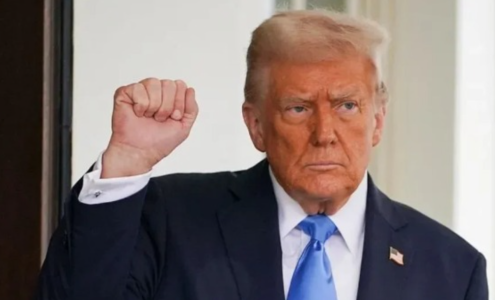Aussies, beware: Expert warns Trump's tariffs could spell disaster for your wallet
By
Gian T
- Replies 0
In the ever-shifting landscape of global politics and economics, the decisions made by world leaders can have far-reaching consequences that ripple across oceans and affect the lives of everyday citizens.
One such decision that has raised alarm bells for Australians is the imposition of tariffs by former US President Donald Trump.
A well-known financial advisor has issued a stark warning that these tariffs could have dire implications for the Australian economy and, by extension, the economic well-being of its residents.
Trump's executive order imposed a hefty 25 per cent tariff on all aluminium and steel imports into the US ‘without exemption.’
This move has raised concerns for the targeted industries and the broader economic health of nations trading with the US.
The move, which Trump justified as necessary to bolster domestic manufacturing and curb illegal immigration and drug trafficking, has been met with criticism and apprehension from economic experts and commentators alike.
Scott Pape, a household name in Australia for his practical financial advice, has likened Trump's tariffs to an act of self-sabotage.
'For the record, I think Trump's tariffs are like setting your house on fire to keep burglars out—they'll cause higher prices, mass job losses, and very likely a recession,'
Pape wrote in his column. This metaphor vividly depicts the potential self-inflicted damage that could arise from such protectionist measures.
The concerns are not unfounded. Dr Greg Jericho, chief economist for the Australia Institute, had previously warned that a US recession triggered by Trump's tariffs could have a domino effect, making a recession 'much more likely' in Australia.
An OECD report supported this view, indicating that a 10 per cent reduction in global trade could result in a 1.2 per cent fall in Australia's GDP.
Australia's heavy reliance on mining and agriculture exports and its significant oil and gas trade means that any reduction in global trade could hit the nation particularly hard.
Recession, characterised by a prolonged period of GDP contraction coupled with rising unemployment, is a spectre that looms over any economy facing such trade headwinds.
Despite the dire predictions, Pape remains somewhat sceptical about the likelihood of Trump's threats coming to fruition.
He suggested that much of Trump's rhetoric may be bluster, a strategic move to dominate media narratives rather than a concrete policy plan.
Pape advised Australians to stay informed but not become consumed by the political drama unfolding in the US.
In a world where the news cycle is relentless and often overwhelming, Pape advocated for a more measured approach to media consumption.
‘I'll be keeping informed, but I won't be obsessively checking the political news every hour, and I'm not on social media...Instead, I carry a physical book with me and read a few pages when I'm bored,’ he said.
‘When I set the book down, I look at my new bookmark and feel like I've achieved something. Read whatever floats your boat, though perhaps don't read Donald's The Art of The Deal.‘
The Barefoot Investor's warning served as a reminder that in our interconnected world, the actions of leaders in one country can significantly impact the economies and lives of people thousands of miles away.
Understanding these global dynamics is crucial for Australians, particularly those over 60 who may be on fixed incomes or approaching retirement.
It's essential to stay informed, plan for uncertainty, and seek trusted financial advice to navigate the potential challenges ahead.
As we continue to monitor the situation, the tariffs in question were part of the Trump administration's policies, and the current political landscape may have evolved since then.
However, the lessons from this episode remain relevant: international trade policies can and do affect domestic economies, and it's wise to be prepared for the ripple effects.

We invite our readers to share their thoughts and experiences. Have you felt the impact of international trade policies on your finances? How do you stay informed and prepared for economic shifts? Join the conversation in the comments below.
One such decision that has raised alarm bells for Australians is the imposition of tariffs by former US President Donald Trump.
A well-known financial advisor has issued a stark warning that these tariffs could have dire implications for the Australian economy and, by extension, the economic well-being of its residents.
Trump's executive order imposed a hefty 25 per cent tariff on all aluminium and steel imports into the US ‘without exemption.’
This move has raised concerns for the targeted industries and the broader economic health of nations trading with the US.
The move, which Trump justified as necessary to bolster domestic manufacturing and curb illegal immigration and drug trafficking, has been met with criticism and apprehension from economic experts and commentators alike.
Scott Pape, a household name in Australia for his practical financial advice, has likened Trump's tariffs to an act of self-sabotage.
'For the record, I think Trump's tariffs are like setting your house on fire to keep burglars out—they'll cause higher prices, mass job losses, and very likely a recession,'
Pape wrote in his column. This metaphor vividly depicts the potential self-inflicted damage that could arise from such protectionist measures.
The concerns are not unfounded. Dr Greg Jericho, chief economist for the Australia Institute, had previously warned that a US recession triggered by Trump's tariffs could have a domino effect, making a recession 'much more likely' in Australia.
An OECD report supported this view, indicating that a 10 per cent reduction in global trade could result in a 1.2 per cent fall in Australia's GDP.
Australia's heavy reliance on mining and agriculture exports and its significant oil and gas trade means that any reduction in global trade could hit the nation particularly hard.
Recession, characterised by a prolonged period of GDP contraction coupled with rising unemployment, is a spectre that looms over any economy facing such trade headwinds.
Despite the dire predictions, Pape remains somewhat sceptical about the likelihood of Trump's threats coming to fruition.
He suggested that much of Trump's rhetoric may be bluster, a strategic move to dominate media narratives rather than a concrete policy plan.
Pape advised Australians to stay informed but not become consumed by the political drama unfolding in the US.
In a world where the news cycle is relentless and often overwhelming, Pape advocated for a more measured approach to media consumption.
‘I'll be keeping informed, but I won't be obsessively checking the political news every hour, and I'm not on social media...Instead, I carry a physical book with me and read a few pages when I'm bored,’ he said.
‘When I set the book down, I look at my new bookmark and feel like I've achieved something. Read whatever floats your boat, though perhaps don't read Donald's The Art of The Deal.‘
The Barefoot Investor's warning served as a reminder that in our interconnected world, the actions of leaders in one country can significantly impact the economies and lives of people thousands of miles away.
Understanding these global dynamics is crucial for Australians, particularly those over 60 who may be on fixed incomes or approaching retirement.
It's essential to stay informed, plan for uncertainty, and seek trusted financial advice to navigate the potential challenges ahead.
As we continue to monitor the situation, the tariffs in question were part of the Trump administration's policies, and the current political landscape may have evolved since then.
However, the lessons from this episode remain relevant: international trade policies can and do affect domestic economies, and it's wise to be prepared for the ripple effects.
Key Takeaways
- The Barefoot Investor, Scott Pape, has expressed concerns that Australia could face a recession if President Donald Trump's proposed tariffs are implemented.
- Trump's executive order imposes a 25 per cent tariff on aluminium and steel imports, potentially escalating a trade war that could have significant global economic impacts.
- Dr Greg Jericho, an economist, warned that such tariffs and consequent trade retaliation could heavily impact Australia's economy, mainly due to its reliance on mining and agricultural exports.
- Australian Prime Minister Anthony Albanese has spoken with President Trump to argue for an exemption for Australia from these new tariffs, particularly concerning aluminium and steel imports.








